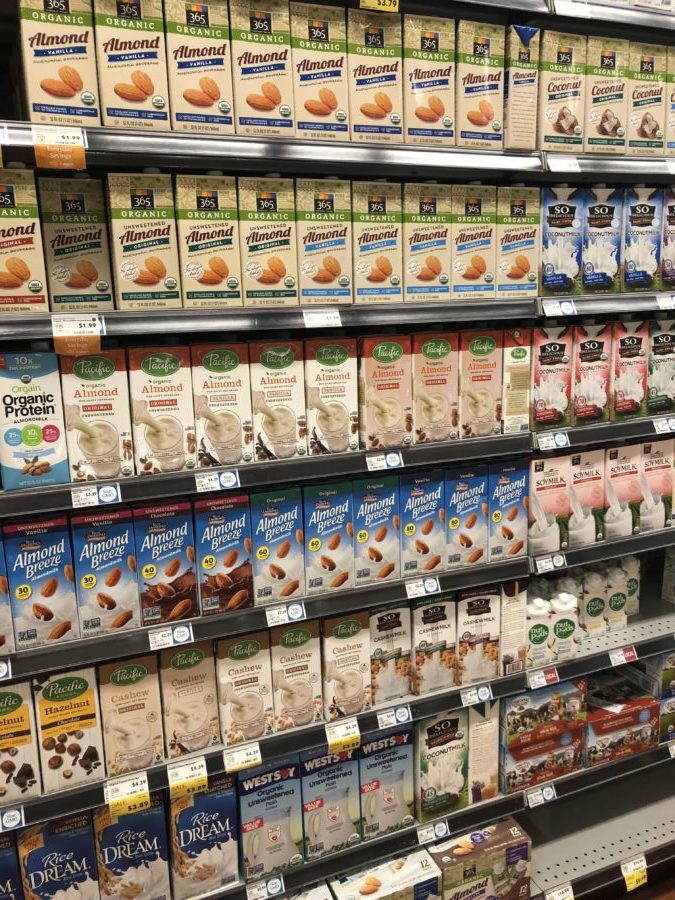People are ditching dairy for all kinds of reasons these days. Some reasons are legit and others not so much, but I won’t get into all that today. This means that people are looking for an alternative to cow’s milk for their cereal, lattes, and smoothies. People are “milking” just about anything these days, so it gets tricky trying to figure out what’s the “best” option.
Today I’m focusing on the top 5 non-dairy milk alternatives that are trending at the grocery store and local coffee shops. Let’s review the “pros” and “cons” of each and then you guys can make your own educated decision on what works best for you!

does this give anyone else anxiety??
Soy
Pros: Definitely the winner when it comes to protein content. Most brands contain 6-8 grams of protein per servings which is much higher than it’s competitors. Good source of calcium and Vitamin D due to fortification.
Cons: Soy is a controversial ingredient and many experts disagree on its health benefits and/or risks. Soy milk contains phytoestrogens, which are plant compounds that look like estrogen to the body. Studies disagree over whether or not phytoestrogens may disrupt hormone balance. Also, most soy grown in the US is genetically modified so choose organic if that’s something you try to avoid. I personally feel soy in moderation is completely safe, but do your research.
Almond
Pros: My personal favorite. I mean almonds are loaded with nutrients so this is a no brainer….if you make your own 😉 Good source of Vitamin E, magnesium, and potassium and lowest in calories.
Cons: Most options on the market are super watered down tasting and contain very few actual almonds; therefore, most of the vitamins and minerals in the milk are added via fortification. Fortification is not a bad thing by any means, but it’s best to get nutrients from the whole food if available.
Coconut
Pros: If you have a nut allergy and want to avoid soy, coconut milk might be the best non-dairy milk alternative option for you. Just like coconut oil, coconut milk contains healthy fats like MCT (medium chain triglycerides)… hello brain health! It’s also rich in B vitamins and minerals like iron and calcium. I’m a big fan of coconut milk creamer in my coffee…thick and creamy.
Cons: Very low in protein…0-1 grams per serving. The carton version is much more watered down than the canned version. The canned coconut milk is much more nutrient/calorically dense so be mindful of that.
Oat
Pros: The new kid on the block…super trendy in hipster coffee shops because it is DELICIOUS! It’s thick, creamy, and makes great foam (dream come true for a barista). Naturally sweeter taste from the oats (even the unsweetened version). Good option for someone with a dairy, soy and nut allergy. It also has a decent amount of protein per serving (about 4 grams).
Cons: Highest in carbs (24 carbs per serving) so it’s not Whole 30 or Paleo compliant if that’s your jam. People that are super anti grains due to gluten contamination and pesticides are not on board. It can also potentially be made with canola oil (inflammatory) so be aware of that for sure!
**Not going to lie I’ve only had one oat milk latte and it was dreamy, but not something I would drink on the reg.
Hemp
Pros: It is made from hemp seeds which I’m a big fan of and people like it because it has a somewhat nutty flavor with a thicker and creamier consistency than other non-dairy milk alternatives. It has a little bit more protein than other nut milks (about 2 grams protein per serving) and a good source of omega 3 fatty acids.
Cons: Many of the packaged versions contain carrageenan so read your labels. Most nutrients are added via fortification…Riboflavin, Phosphorus, Magnesium, and Vitamins B12, D, and A.

No matter what you choose it’s ideal to opt for the unsweetened version because many of these “milks” have added sugars especially in the flavored kinds (vanilla and chocolate). Also don’t hesitate to ask your barista about the milk they are using…most coffee shops are now using a barista blend which means it has added sugars.
I would love to hear what dairy alternatives you all are using and why? What other questions and/or concerns do you have about dairy milk alternatives? Of course I’m big on making your own nut milk if you have the time…you’re in charge of the ingredients and the flavor is unreal (not watered down!) You will never want store bought almond milk again. My almond milk recipe is here. Enjoy!
xx, Alix
